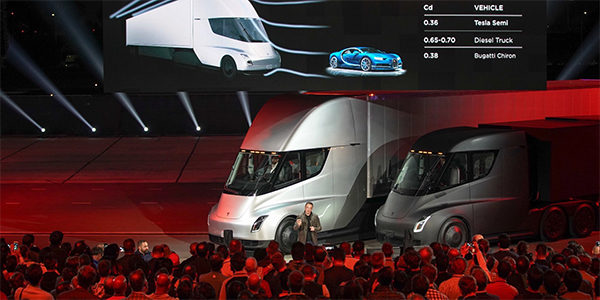Tesla unveils electric semi tractor with 500-mile range

Electric car manufacturer Tesla unveiled an electrically powered tractor-trailer on Thursday that the company says will outperform conventional diesel-powered trucks while boasting a driving range of 500 miles when production begins in 2019.
Tesla, which is known for building electric-powered sports cars that can accelerate faster than most gas-powered vehicles, said it planned to use the same approach for its Class 8 truck.
The Tesla Semi truck will use four independent electric motors on its rear axles to generate enough power to push a tractor with no trailer from zero to 60 mph in five seconds, compared to 15 seconds for a typical diesel tractor, Tesla founder Elon Musk said in a launch event broadcast from an airplane hangar near the company's Hawthorne, Calif., facility. Addressing common concerns about the limited range of electric vehicles, Musk said the electric semi could charge its batteries for 30 minutes and then haul an 80,000-pound loaded trailer at a highway speed of 60 mph for 500 miles.
The company did not disclose the planned cost of the Tesla Semi, but said that commercial fleets that buy electric-powered trucks could see a two-year payback compared to the cost of a diesel tractor. That savings would come from a reduction in fuel bills, improved aerodynamics, and cuts in maintenance costs because electric motors do not rely on standard engine components like the transmission and brakes, Musk said. Instead of using conventional brake pads, Tesla Semis will control their speed through a process called "regenerative braking" that converts the vehicle's momentum into battery power, he said.
While Tesla has been building electric cars for the consumer market since launching its Roadster in 2008, the company will face additional competition from established providers as it launches a product for the commercial trucking sector. Automaker Daimler AG makes the Fuso eCanter electric-powered light truck, Nissan demonstrated an electric truck concept in 2012, and Cummins is developing an electric semi called the Urban Hauler Tractor.
Despite the competition, Tesla notched some sales immediately after its announcement when trucking and intermodal giant J.B. Hunt Transport Services Inc. said it had placed a reservation to purchase "multiple" Tesla Semi tractors. The company did not reply to a request for additional details about the purchase.
Lowell, Ark.-based J.B. Hunt plans to use the electric tractors for its intermodal and dedicated contract services divisions to support operations on the West Coast, the company said. "Reserving Tesla trucks marks an important step in our efforts to implement industry-changing technology," J.B. Hunt president and CEO John Roberts said in a statement. "We believe electric trucks will be most beneficial on local and dray routes, and we look forward to utilizing this new, sustainable technology."
J.B. Hunt's order may help to demonstrate the viability of electric tractors by soothing other carriers' concerns about the technology's torque, total hauling capacity, and recharging infrastructure, according to a note to investors from the investment firm Baird Equity Research. "We believe attitudes are changing rapidly, given the material development of electric tractor capabilities over the past 12 months, and we expect other long-haul truckload/intermodal/dedicated service providers to similarly adopt electric tractor technology into their fleets as the technology evolves and is proven to be economically viable," Baird Senior Research Analyst Benjamin Hartford said in the note.
Many transportation and logistics firms see a strong case for adding electric trucks to their fleets as a way to alleviate the rising costs of labor and fuel, said David Egan, global head of industrial and logistics research at Los Angeles-based real estate and logistics services firm CBRE Group Inc. Electric trucks offer fleet operators a way to slash fuel costs, while opening the door to increased autonomous driving capabilities, he said.
"There's going to be a lot of pushback in the industry because of entrenched diesel automotive-technology providers, but this is the way all automobiles are going; we're going to see fewer internal combustion engines over time," Egan said. "This is going to be a massive game changer within our lifetimes, and probably within our careers."
Tesla has designed its electric semi to support increasing levels of autonomous driving performance, Musk said at the launch. The cab of a Tesla Semi features a central seating position with touch screen monitors on each side of the driver that support the vehicle's enhanced autopilot capabilities, such as automatic emergency braking, lane keeping, lane departure warning, and jack-knife prevention systems.
In addition, the Tesla Semi is designed to support operations in convoy or "platooning" mode, where multiple trucks use precision telematics and wireless communications to save gas by drafting in quick succession as they follow a human driver in a lead vehicle. Investors have been supporting increasing research into that strategy, with moves like the $60 million in venture funds land by automated-vehicle systems developer Peloton Technology in April.
Related Articles

Copyright ©2024. All Rights ReservedDesign, CMS, Hosting & Web Development :: ePublishing